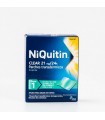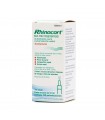It is a medicine that acts as an antiallergic and nasal decongestant. REACTINE Ketirizine/Pseudoephedrine is indicated for the relief of nasal and eye symptoms of seasonal allergic rhinitis when accompanied by nasal congestion, in adults and adolescents over 12 years of age. You should consult your doctor if it gets worse or if it does not improve after 7 days of treatment.
ACTION AND MECHANISM
- Antiallergic. Levocabastine is a cyclohexyl-piperidin derivative that acts as an antiallergic due to its antagonistic effects of H1 histaminrgic receptors.
It lacks effects on other receptors such as serotonergic, cholinergic or dopaminergic. It has antagonistic effects on alpha adrenergic receptors at doses far higher than therapeutic ones.
Elderly
No specific problems have been reported in elderly people forcing a dosing readjustment.
PATIENT ADVICE
- Extreme hygienic measures during administration. Wash your hands with soap and water before administering levocabastin, and avoid touching the bottle dropper with any surface.
- Call your doctor and/or pharmacist if symptoms continue or worsen during the use of levocabastine.
- Containing benzalkonium chloride may cause eye irritation.
- May cause discoloration and alterations in soft contact lenses, so it is recommended to avoid contact with them. Contact lenses must be removed before application and wait at least 15 minutes before re-attaching.
Contraindications
- Hypersensitivity to levocabastine or any other component of the medicine.
DRIVING EFFECTS
Levocabastine does not appear to have significant effects on the ability to drive. However, like any other ophthalmic administration drug, blurred vision may appear immediately after use. It is recommended to avoid driving until vision is normal.
Pregnancy
FDA Category C.
Animal safety: cases of teratogenicity (polydactyly, brachygnathia, hydrocephalus) and increased fetal resorption in rats have been reported following systemic administration at DOS 16,5000 DMRH ophthalmically. These effects were not reported at lower doses.
Human safety :adequate and well-controlled human studies are not available. Administration of antihistamines during pregnancy was not related to an increased incidence of congenital malformations, although a small increase in cardiovascular defects, preterm birth and low birth weight was observed.
Administration is only accepted if there are no safer therapeutic alternatives, and the benefits outweigh the potential risks.
Effects on fertility :no specific human studies have been conducted.
Pharmacokinetics
Ophthalmic route:
- Absorption: slow and incomplete, with a bioavailability of 30-60%. The cmax (1.2 ng/ml) is reached at 1.2 h. The effects appear at 15 min and last for 4 hours.
- Distribution: 55% protein binding. Your vd is 1.1 l/kg.
- Metabolism: minimally by glucuronidation, resulting in levocabastine acil-glucuronide, inactive metabolite.
Enzyme inducing/inhibitor capacity : does notappear to have an important effect.
- Excretion: in urine (75-80%; 65-70% unchanged) and faeces (20%). Its t1/2 is 33-40 h and its CLt is 30 ml/min.
Pharmacokinetics in special situations:
- Children: cmax of 18.2 ng/ml has been found after nasal and ophthalmic administration. The data are very limited and do not allow conclusions to be drawn about their differences with adults.
- Elderly: they have a slightly slower elimination, slightly increasing the tmax (15%) and cmax (26%).
- Renal impairment: patients with moderate to severe impairment (CLcr 10-50 ml/min) had an increase in t1/2 (up to 95 h) and AUC (56%). Levocabastine is hemodializable (10% dose).
- Liver failure: no data available.
Indications
- Symptomatic treatment of [ALLERGIC CONJUNCTIVITIS].
Interactions
No interactions have been reported.
Breast feeding
Animal safety: no data available.
Human safety :levocabastine is excreted in milk (0.3%) after oral administration. There are no data on ophthalmic administration, but taking into account its low dose and poor absorption, milk concentrations are not expected to be significant. However, the consequences for the infant have not been evaluated, so it is advised to use it with caution.
Children
Safety and efficacy in children under 4 years of age have not been evaluated, so it is recommended to avoid their use.
RULES FOR PROPER ADMINISTRATION
Precautions should be exercised to avoid contaminating eye drops throughout administration of the medicinal product. To do this, hands should be washed prior to administration, and the dropper should be avoided contact with any surface of the body, including eyelids and surrounding areas.
Before administration, eye drops should be shaken.
"Rules for eye drop management"
1. Tilt your head back.
2. Pull the lower eyelid with an index finger and look up.
3. Institulate a drop in the conjunctival sac, keeping the bottle vertical with the dropper facing down.
4. Once the drop is applied, flash repeatedly to distribute the eye drops. To reduce the possible systemic absorption of levocabastine it is recommended to press the tear sac for one minute or close the eyelids tightly for 2-3 min, immediately after administration of eye drops.
If other ophthalmic medicinal products are being used, it is recommended to distance administrations at least 10 minutes. Those presentations in the form of gel will be the last to be administered.
Dosage
"Reactine Levocabastine"
- Adults and adolescents from 12 years: 1 drop in each eye, 2 times a day. If necessary, the dose could be increased to 1 drop in each eye, 3-4 times a day.
- Children < 12 years: not recommended.
- Elderly: no specific dosage recommendations have been made.
Duration of treatment: consult your doctor and/or pharmacist if symptoms continue or worsen after 2 days of use.
POSOLOGY IN HEPATIC IMPAIRMENT
No specific dosing recommendations have been made.
POSOLOGY IN RENAL INSUFFICIENCY
No specific dosing recommendations have been made.
Precautions
- [RENAL INSUFFICIENCY]. Levocabastine is excreted unchanged in urine, with a decrease in its elimination observed in patients with renal impairment. Although no specific dosage recommendations have been made, it is recommended to use with caution in the absence of specific studies in these patients.
EXCIPIENT PRECAUTIONS
- Containing benzalkonium chloride may cause eye irritation.
- May cause discoloration and alterations in soft contact lenses, so it is recommended to avoid contact with them. Contact lenses must be removed before application and wait at least 15 minutes before re-attaching.
ADVERSE REACTIONS
Adverse reactions are described according to each frequency interval, considered very common (>10%), common (1-10%), uncommon (0.1-1%), rare (0.01-0.1%), very rare (<0.01%) or of unknown frequency (cannot be estimated from the available data).
- Digestives: frequent [DRY MOUTH].
- Neurological/psychological: very rare [CEFALEA]; unknown frequency [SEDATION], [SOMNOLENCIA].
- Respiratory: frequent [EPISTAXIS], [TOS].
- Dermatological: very rare [CONTACT DERMATITIS], [URTICARIA], [ANGIOEDEMA].
- Allergic: very rare [HYPERSENSITIVITY REACTIONS].
- Ophthalmological: very common [OCULAR IRRITATION]; common local eye reactions of an irritative type, including burning, stinging or [EYE PRURITUS]; [EYE PAIN], [CONJUNCTIVITIS], [PARPED EDEMA], [OCULAR OEDEMA], [BLEFARITIS], [CONJUNCTIVAL HYPEREMIA], [BLURRED VISION].
- General: unknown frequency [ASTENIA].
ADVERSE REACTIONS RELATING TO EXCIPIENTS
- Containing benzalkonium chloride may cause [OCULAR IRRITATION].
Overdose
Symptoms: no clinical experience. In case of ingestion of eye drops (would involve the administration of a total dose of 2 mg) some sedation may occur.
Measures to be taken:
- Antidote: there is no specific antidote.
- General elimination measures: it is recommended to ingest plenty of fluids to promote renal excretion.
- Monitoring: no special monitoring seems necessary.
- Treatment: symptomatic.




























